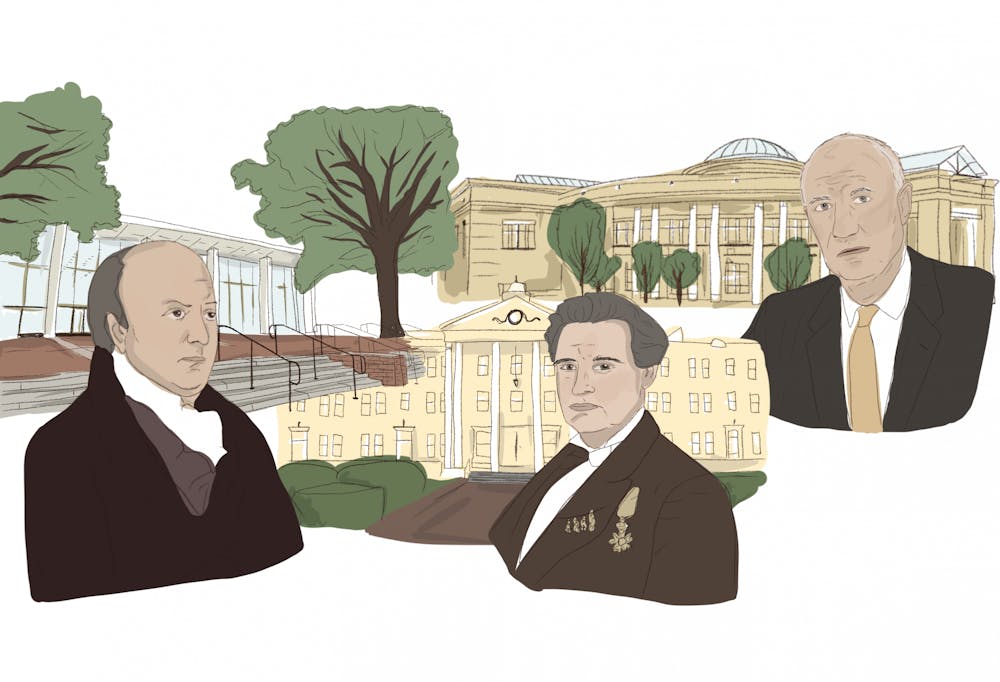In recent years, the USC community has begun to question who should have a landmark or building on campus named after them.
In 2019, a history commission was created to "explore the university’s history and to make recommendations that will guide how a more complete story of the state’s flagship can be told to future generations," according to its website.
In July, the history commission released its final report, which recommended changing 10 of the 13 names it examined and proposed 16 new names for future naming opportunities.
Some were not satisfied with the report, as its recommendations to change names is impossible without a vote from the state legislature, due to South Carolina's Heritage Act.
"If somebody's values during their life didn't live up to the standards that the university sets for us in the Carolina Creed and the standards of modern society, then they shouldn't have a building or monument named after them," Emma Schwertfuehrer, the head of USC's College Democrats, said.
Of the names that were examined, some are more recognizable than others. Figures such as Strom Thurmond and Robert E. Lee are nationally known, while Marion Sims and Wade Hampton are lesser-known figures, even in South Carolina.
J. Marion Sims, the name of a residence hall in USC's Women's Quad, was the first name the commission recommended to be changed. Sims studied at South Carolina College — what is now USC. The women's residence hall was named for Sims, as he is known as the "father of modern gynecology."
Despite Sims' contributions to modern science, he is notorious for performing live experiments on enslaved Black women without anesthesia. These women were rented as property and had no choice in the matter.
"There was a belief at the time, and this belief has lingered into the 20th century, that Black skin feels less pain than white skin and that, therefore, Black women, and these enslaved women, would be able to tolerate more pain than white women," university archivist Elizabeth West said.
At the time, USC was naming buildings after prominent members of USC and South Carolina history. There was not a proper donor system for naming buildings like there is today.
Another residence hall at Women's Quad is named for Wade Hampton. Hampton graduated from South Carolina College in 1836 and later served as a trustee for the school.
Hampton's name was picked for the residence hall due to his connections to USC and his role as a Confederate military officer in the Civil War and a prominent South Carolina politician. He served as both a U.S. senator and a governor for the state.
Hampton's family was also one of the largest holders of enslaved people in the Southeast before the Civil War.
"His family was incredibly well-known, politically connected, powerful and wealthy in South Carolina," Chase Meyer, a political science professor at USC, said.
Hampton was also a leader of the movement known as Redemption, a movement of white Southerners who aimed to reestablish white supremacy in the South post-Reconstruction.
"This is where groups such as the Ku Klux Klan, or another organization known as the Red Shirts, come in," Meyer said. "While he wasn't as openly, vocally supportive of the terrorism, as others were, he clearly was a supporter of it."
The commission recommended for Hampton's name to be changed.
Thomas Cooper, the namesake of the primary library for USC students, is another name that was recommended to be changed. Cooper was the president of USC from 1820 to 1834, and an economist and political philosopher. The library was named after him due to his being a prominent figure in USC history.
"(Cooper) was someone who kind of first advocated for the idea of South Carolina leaving the Union," Meyer said. "His support for secession was more just about classical states rights."
Cooper grew increasingly pro-slavery over the course of his life. In public and private writings, he shared racist sentiments, such as disagreement with emancipation.
Strom Thurmond Wellness and Fitness Center, the primary fitness facility of USC, is named after longtime U.S. senator of South Carolina, Strom Thurmond. The commission recommended the name of the fitness center to be changed.
Thurmond ran as a third-party candidate for president in 1948 under a pro-segregation and pro-Jim Crow platform. He is also known for holding the longest filibuster in U.S. Senate history, when he filibustered for just over 24 hours in opposition to the Civil Rights Act of 1957.
The fitness center was named after Thurmond due to his being a donor to USC and his dedication to fitness.
"Civil rights was not his entire Senate career, but it was without question the one he was most well known for," Meyer said.

